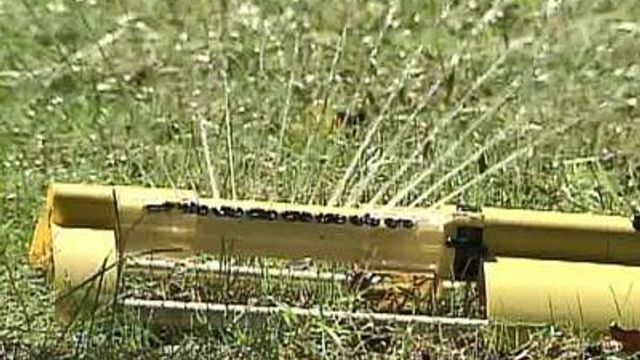Cary, Holly Springs to Ban Sprinkling
Cary and Holly Springs have become the latest area municipalities to ban lawn watering with sprinklers.
Posted — UpdatedCary's new water restrictions, which cover hose-end and automatic sprinklers, will take effect Nov. 1, according to town spokeswoman Susan Moran. The town has had year-round restrictions in place for several years that call for alternate-day watering.
The rules also apply to residents in Morrisville, which buys water from Cary. Homeowners that use reclaimed water – partially treated wastewater recycled for irrigation use – will be exempt from the tighter restrictions.
Watering by hand will be allowed any day of the week in Cary and Morrisville, under the new rules. Violators will get one warning before fines of $500 to $1,000 kick in for subsequent offenses.
Cary homeowner Patrick Amrine said he cut back watering his yard earlier this summer because of the continuing drought, and he said he agrees with the decision to halt the use of sprinklers.
"I used to have one of the greenest lawns in the neighborhood. Now, it's one of the rattier-looking ones," Amrine said. "It's time for municipalities to step up, not the homeowners."
Sprinklers also will be banned in Holly Springs as of Nov. 1, and hand watering will be limited to two days a week. Watering permits for newly seeded or sodded lawns issued on or after Wednesday will expire on Nov. 1, although permits issued earlier will expire 30 days after they were issued.
“We need to be good stewards of our water resources,” Town Manager Carl Dean said in a statement. “It's the right thing to do.”
Cary has more than 200 days of available water in Jordan Lake – about double the amount that Raleigh and Durham have in their reservoirs – but Moran said the tighter restrictions have been adopted in response to Gov. Mike Easley's request for statewide water conservation.
"We are members of a larger community, and the discussion came up to say this is the right time," said Mike Bajorek, Cary's interim director of public utilities.
Easley on Monday called on all communities and every North Carolina resident to cut back on water consumption. The statewide drought is expected to continue in the coming months, he said, and conserving more now could prevent a crisis situation from developing next spring.
“Even though we are not in the dire situation of other communities, we want to continue doing our part to help our neighbors and to do our best to ensure we have plenty of water for the future,” Cary Town Manager Bill Coleman said in a statement.
Outdoor irrigation accounts for about half of Cary's water usage during the summer, officials said.
Durham banned outdoor watering on Tuesday. A ban approved by the Raleigh City Council takes effect on Oct. 23. Apex officials banned outdoor irrigation as of Friday.
Raleigh's new rules allow watering of plants using a hand-held hose during a specified hours two days each week, and Apex continues to allow watering with water cans.
Still, fewer than half of the 600 public water systems in North Carolina are under any form of water restrictions. Twenty-three percent have voluntary conservation measures in effect, 19 percent are enforcing mandatory restrictions and systems in Siler City and Rocky Mount are under emergency measures.
Jordan Lake is about 5½ feet below normal levels, but the water supply in the lake isn't fully allocated, which is why Cary isn't in as dire a situation as Raleigh in terms of water availability, according to the Army Corps of Engineers, which manages the lake.
Meanwhile, Falls Lake, which is Raleigh's primary reservoir, is about 8 feet below normal levels, and is experiencing the lowest water flow in the 80 years data has been collected on the Neuse River, the Corps said. Flows on the Neuse are also critical to municipal and commercial intakes downstream in Clayton, Smithfield and Goldsboro.
“It looks like nature could be challenging us to the limit,” Terry Brown, water control manager for the Corps' Wilmington District, said in a statement. “We are certainly working hard to respond to the ‘worst case’ eventuality that we get little or no rain in coming months.”
• Credits
Copyright 2024 by Capitol Broadcasting Company. All rights reserved. This material may not be published, broadcast, rewritten or redistributed.






